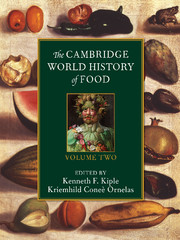Book contents
- Frontmatter
- Part V Food and Drink around the World
- Part VI History, Nutrition, and Health
- Part VII Contemporary Food-Related Policy Issues
- VII.1 The State, Health, and Nutrition
- VII.2 Food Entitlements
- VII.3 Food Subsidies and Interventions for Infant and Child Nutrition
- VII.4 Recommended Dietary Allowances and Dietary Guidance
- VII.5 Food Labeling
- VII.6 Food Lobbies and U.S. Dietary Guidance Policy
- VII.7 Food Biotechnology: Politics and Policy Implications
- VII.8 Food Safety and Biotechnology
- VII.9 Food Additives
- VII.10 Substitute Foods and Ingredients
- VII.11 Nonfoods as Dietary Supplements
- VII.12 Food Toxins and Poisons from Microorganisms
- VII.13 The Question of Paleolithic Nutrition and Modern Health: From the End to the Beginning
- Part VIII A Dictionary of the World’s Plant Foods
- Name Index
- Subject Index
- References
VII.1 - The State, Health, and Nutrition
from Part VII - Contemporary Food-Related Policy Issues
Published online by Cambridge University Press: 28 March 2008
- Frontmatter
- Part V Food and Drink around the World
- Part VI History, Nutrition, and Health
- Part VII Contemporary Food-Related Policy Issues
- VII.1 The State, Health, and Nutrition
- VII.2 Food Entitlements
- VII.3 Food Subsidies and Interventions for Infant and Child Nutrition
- VII.4 Recommended Dietary Allowances and Dietary Guidance
- VII.5 Food Labeling
- VII.6 Food Lobbies and U.S. Dietary Guidance Policy
- VII.7 Food Biotechnology: Politics and Policy Implications
- VII.8 Food Safety and Biotechnology
- VII.9 Food Additives
- VII.10 Substitute Foods and Ingredients
- VII.11 Nonfoods as Dietary Supplements
- VII.12 Food Toxins and Poisons from Microorganisms
- VII.13 The Question of Paleolithic Nutrition and Modern Health: From the End to the Beginning
- Part VIII A Dictionary of the World’s Plant Foods
- Name Index
- Subject Index
- References
Summary
Overview
The science of nutrition has influenced consumers in their choices about the kinds and optimal amounts of food to eat, but there are other influences as well, such as prosperity levels within a given population, the efficiency of transportation and distribution systems, and the standards of hygiene maintained by food producers, processors, and retailers.
One factor, however, that has not received much scholarly attention is the increased role of the state, either through direct or indirect means, in the production, distribution, and consumption of food. Only recently have historians addressed the development of food policies (mostly those in Europe) in order to understand the state’s role in controlling and monitoring food supplies.
In early modern European societies, the maintenance of public order and the control of food supply were intimately related; religious and secular authorities alike had a vested interest in ensuring that production met the demands of consumption. The actions of these authorities (the distribution of food or price-fixing, for example) were largely responses to localized crises. What distinguishes modern food policies from their early modern antecedents are the intended goals of these policies, as well as the scientific nature of their implementation.
The rise of industrialization and urbanization in the nineteenth century prompted new concerns about food supplies. The competitive nature of an industrialized, capitalist food market increased popular anxieties about adulteration; one of the more important roles of the state was to regulate the hygienic quality of food supplies. The economic conditions of the nineteenth century provoked greater concern with population’s risking dietary deficiencies and, therefore, poor health. Social reformers and scientific experts took a more active and deliberate interest in monitoring the health of the laboring classes through the measurement of food consumption levels.
- Type
- Chapter
- Information
- The Cambridge World History of Food , pp. 1577 - 1585Publisher: Cambridge University PressPrint publication year: 2000
References
- 2
- Cited by



